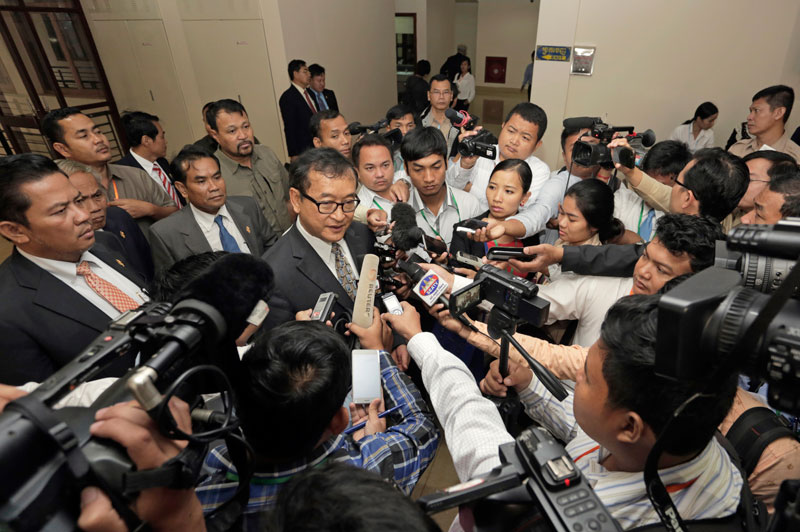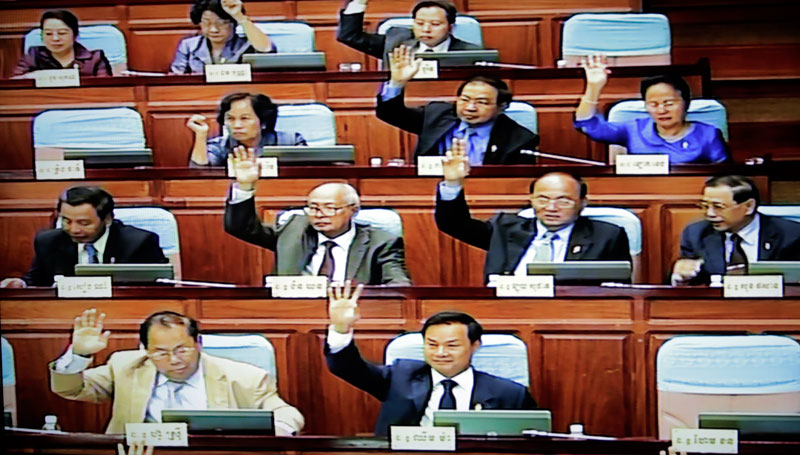The National Assembly unanimously passed new rules Friday that will recognize a minority leader from an opposition party with more than 25 percent of parliamentary seats and allow parties with at least 5 percent of seats to form an official caucus.
Opposition CNRP leader Sam Rainsy, who is expected to assume the role of minority leader—ostensibly giving him equal footing with Prime Minister Hun Sen in discussions regarding pressing national issues—told 102 lawmakers present at the plenary session that the new rules would ensure a more democratic country.

“The proposed amendment is vitally important, in terms of strengthening democracy in our country of Cambodia,” he said, before the amendments were passed. “It is a move to recognize nongovernment parties that we used to call opposition parties.”
The initial agreement to officially recognize minority parties, along with a minority leader, was made by Mr. Rainsy and Mr. Hun Sen—who was absent from Friday’s parliamentary sitting—during a private meeting on November 28.
Speaking by telephone after the session, Mr. Rainsy declined to say whether he expected to become the country’s first minority leader.
“We need all the legal procedures to be completed before we nominate any person to fulfill this position,” he said.
But Son Chhay, a senior opposition lawmaker and the CNRP’s chief whip, said Mr. Rainsy’s appointment was a sure thing.
“There is no doubt that Mr. Sam Rainsy will be the minority leader,” he said.
Mr. Chhay said that the new rules allowing opposition parties with more than 5 percent of Assembly seats to form a party caucus included provisions guaranteeing that those parties would receive a budget and staff to increase their influence in parliament.
“As soon as you have a party caucus you can have a budget and have a system to allow the party caucus to hire experts and staff to work in a more professional way,” he said.
But Mr. Chhay, who has long lobbied for the establishment of a British-style parliamentary system with a shadow cabinet, said the new rules were merely a positive first step.
“This probably is not the way the system ought to be,” he said. “We ought to have an opposition or a shadow cabinet and have this kind of setting of question time for the opposition to question the prime minister,” he said, adding that the new rules were still a constructive shift from the status quo.
“I think by having this in place and clearly indicating in our internal rules about the role of the minority leader, it could open a new chapter, a new way to create a better political environment for this country,” Mr. Chhay said.

Addressing parliamentarians before the vote, CPP lawmaker Pen Pagna, who has led the ruling party in talks to reform the Assembly’s internal rules, said the new provisions were necessary to enhance interparty dialogue.
“Aiming for the enrichment of the National Assembly in fulfilling its obligations, and responding to today’s scale of work and to strengthen the culture of dialogue, it’s necessary to amend chapter 12 and article 48 new (2) of the National Assembly’s internal rules,” Mr. Pagna said.
Taking the floor after the vote, National Assembly Vice President Kem Sokha, who is also vice president of the CNRP, noted that discussions between the minority leader and the prime minister would not replace debate within the country’s main legislative body.
“This doesn’t mean that every parliamentarian will give their destiny to the leading parliamentarians of parties, or the minority leader, and that the two prime ministers will have absolute control over decisions on the nation’s destiny,” Mr. Sokha said.
“Such dialogue, I think, will not be able to issue any law and decision officially,” he added. “It’s just talk to find a resolution for us to facilitate and bring the issue before the National Assembly to approve.”
(Additional reporting by Colin Meyn)



